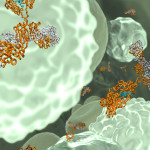Registration for this free event is now open!
January 21 2021, 9am PST/12 ET/6pm CET
Speakers: Drs. Andrew Bradbury and M. Frank Erasmus (Specifica)
Antibody Discovery in the Cloud: Using NGS to expand the universe of selectable antibodies
The Specifica Generation 3 platform is able to generate 500-5000 different antibody clonotypes against targets of interest, with over 80% of selected antibodies having no measurable biophysical liabilities and 20% having subnanomolar affinities. The most common approach to selecting antibodies from display technologies involves low-throughput random colony screening. However, this missed many potential therapeutic leads, particularly when diversity is high. Specifica uses next generation sequencing (NGS) to build its libraries as well as characterize selection outputs. In order to fully exploit the universe of selectable antibodies, Specifica has developed a cloud-based software platform, designed exclusively for antibody engineers and bioinformaticians, to enable a streamlined identification of leads with broad epitope coverage. Application of this to selection outputs has increased the number of clonotype leads by five to ten fold over random colony screening, significantly expanding the explorable paratope space.


